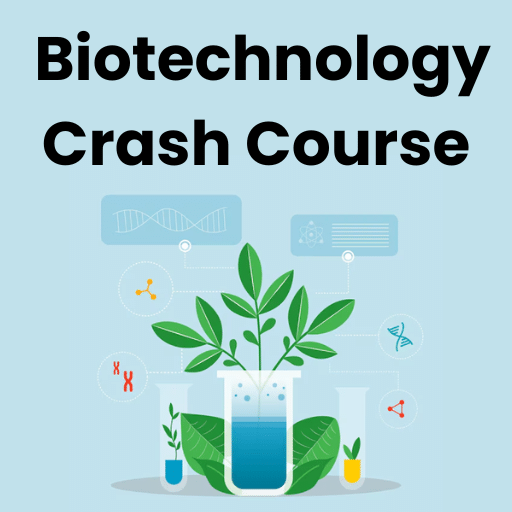
|
PARTNER COURSE
Crash Course for GATE Biotechnology305 students learning this week · Last updated on Sep 05, 2025 |
Crash Course for GATE Biotechnology Study Material
Trending Courses for GATE Biotechnology
Crash Course for GATE Biotechnology Exam Pattern 2025-2026
Crash Course for GATE Biotechnology Exam Pattern
The Graduate Aptitude Test in Engineering (GATE) is a crucial examination for aspiring candidates in the field of Biotechnology. Understanding the exam pattern is essential for effective preparation. Here’s a comprehensive overview of the GATE Biotechnology exam pattern.
1. Exam Format
The GATE Biotechnology exam consists of the following formats:
- Type of Questions: Multiple Choice Questions (MCQs), Multiple Select Questions (MSQs), and Numerical Answer Questions (NATs).
- Number of Questions: A total of 65 questions.
2. Total Marks
The GATE Biotechnology exam is conducted for a total of 100 marks.
3. Duration of the Exam
The examination lasts for 3 hours.
4. Marking Scheme
- MCQs: 1 mark for each correct answer and a penalty of 1/3 mark for each incorrect answer (for questions with 1 mark), and 2 marks for each correct answer with a penalty of 2/3 mark for incorrect answers (for questions with 2 marks).
- MSQs: No negative marking.
- NATs: No negative marking.
5. Syllabus Overview
The syllabus for GATE Biotechnology can be broadly categorized into:
- Biochemistry: Enzyme kinetics, Metabolism, and Molecular Biology.
- Microbiology: Microbial genetics, Physiology, and Industrial microbiology.
- Genetics: Mendelian genetics, Population genetics, and Genomic technologies.
- Bioprocess Engineering: Fermentation technology, Bioreactor design, and Downstream processing.
6. Important Subjects
- Cell Biology: Cell cycle, Signal transduction, and Cell culture.
- Plant and Animal Biotechnology: Genetic engineering, Tissue culture, and Bioproduction.
- Bioinformatics: Data analysis, Sequence alignment, and Computational tools.
7. Preparation Tips
- Understand the Syllabus: Thoroughly review the syllabus to identify key topics.
- Practice Previous Papers: Solve past GATE papers to familiarize yourself with the question format.
- Mock Tests: Take regular mock tests to assess your preparation and improve time management.
Conclusion
Understanding the GATE Biotechnology exam pattern is crucial for developing a focused study plan. A well-structured approach to preparation will significantly enhance your chances of success in the examination.
This structure includes clear headers and key points, making the content visually appealing and easy to navigate.
Crash Course for GATE Biotechnology Syllabus 2025-2026 PDF Download
GATE Biotechnology Crash Course
The GATE Biotechnology exam is a crucial step for aspiring biotechnology engineers and researchers. This syllabus breakdown will guide you through the key areas of study, ensuring you are well-prepared for the examination.
GATE Biotechnology Engineering Mathematics
- Linear Algebra: Matrices, determinants, eigenvalues, and eigenvectors.
- Calculus: Differential calculus, integral calculus, and multivariable calculus.
- Probability and Statistics: Basic probability theory, random variables, distributions, and statistical inference.
- Differential Equations: Ordinary differential equations and their applications in biological systems.
GATE Biotechnology General Biology
- Cell Biology: Cellular structure, function, and organelles.
- Physiology: Plant and animal physiology, metabolic pathways, and homeostasis.
- Ecology: Ecosystems, biodiversity, and environmental biotechnology.
- Microbiology: Microbial diversity, growth, and applications in biotechnology.
GATE Biotechnology Genetics, Cellular and Molecular Biology
- Molecular Genetics: DNA structure, replication, transcription, and translation.
- Genetic Engineering: Techniques such as CRISPR, gene cloning, and recombinant DNA technology.
- Cell Cycle and Regulation: Mitosis, meiosis, and regulation of the cell cycle.
- Biotechnology Applications: Genomics, proteomics, and biotechnology in medicine.
GATE Biotechnology Fundamentals of Biological Engineering
- Biomaterials: Types and applications in biotechnology.
- Bioreactors: Design, operation, and types of bioreactors.
- Bioinformatics: Introduction to bioinformatics tools and their applications in biotechnology.
- Systems Biology: Understanding biological systems and their interactions through engineering principles.
GATE Biotechnology Bioprocess Engineering and Process Biotechnology
- Bioprocess Design: Principles of bioprocess engineering and design considerations.
- Fermentation Technology: Types of fermentation processes and applications.
- Downstream Processing: Techniques for purification and recovery of bioproducts.
- Quality Control: Assurance and regulatory aspects in bioprocessing.
GATE Biotechnology Plant, Animal and Microbial Biotechnology
- Plant Biotechnology: Tissue culture, genetic modification, and applications in agriculture.
- Animal Biotechnology: Cloning, transgenics, and applications in medicine.
- Microbial Biotechnology: Applications of microbes in industry and environmental management.
- Biopesticides and Biofertilizers: Development and application in sustainable agriculture.
GATE Biotechnology Recombinant DNA Technology and Other Tools in Biotechnology
- Recombinant DNA Techniques: Cloning vectors, restriction enzymes, and transformation methods.
- Gene Therapy: Concepts and applications in treating genetic disorders.
- Biopharmaceuticals: Development of therapeutic proteins and vaccines.
- Synthetic Biology: Engineering biological systems for new functionalities.
Understanding this GATE Biotechnology syllabus is essential for your preparation. Focus on each section, practice regularly, and stay updated with recent advancements in biotechnology to excel in your GATE Biotechnology exam.
This course is helpful for the following exams: GATE Biotechnology
How to Prepare Crash Course for GATE Biotechnology?
How to Prepare Crash Course for GATE Biotechnology
Preparing for the Crash Course for GATE Biotechnology requires a strategic approach to ensure you cover all necessary topics efficiently. Here are some essential steps to help you excel in your preparation:
Understand the GATE Biotechnology Syllabus
- Familiarize yourself with the complete syllabus for GATE Biotechnology. This will help you identify the crucial areas that need your focus.
Create a Study Schedule
- Design a comprehensive study plan that allocates specific time slots for each topic included in the Crash Course for GATE Biotechnology. Stick to this schedule to maintain consistency.
Utilize Quality Study Material
- Gather quality resources specifically designed for the Crash Course for GATE Biotechnology. This includes textbooks, research papers, and previous years’ question papers.
Focus on Core Subjects
- Concentrate on core subjects such as Molecular Biology, Biochemistry, and Microbiology. Ensure you have a strong grasp of these topics as they are integral to the GATE Biotechnology exam.
Practice Mock Tests
- Regularly take mock tests and practice papers related to the Crash Course for GATE Biotechnology. This will help you assess your knowledge and improve your time management skills during the actual exam.
Revise Regularly
- Revision is key in preparation. Allocate time for revisiting concepts learned in the Crash Course for GATE Biotechnology to reinforce your understanding.
Engage in Group Studies
- Join study groups with peers who are also preparing for GATE Biotechnology. Discussing topics can enhance your understanding and provide different perspectives on complex concepts.
Seek Guidance
- Don’t hesitate to seek help from mentors or educators who specialize in GATE Biotechnology. Their insights can provide clarity on difficult topics covered in the Crash Course for GATE Biotechnology.
Stay Updated
- Keep yourself informed about any changes in the syllabus or exam pattern for GATE Biotechnology. This will ensure that your preparation is always aligned with the latest requirements.
Maintain a Healthy Routine
- Lastly, ensure you maintain a balanced routine that includes proper nutrition, exercise, and adequate rest. A healthy mind and body are essential for effective learning during your Crash Course for GATE Biotechnology.
By following these steps, you can effectively prepare for the Crash Course for GATE Biotechnology and increase your chances of success in the GATE Biotechnology examination. Good luck!
Importance of Crash Course for GATE Biotechnology
Importance of Crash Course for GATE Biotechnology
The Graduate Aptitude Test in Engineering (GATE) Biotechnology is a highly competitive exam that assesses the understanding of various concepts in biotechnology. A crash course specifically designed for GATE Biotechnology can play a pivotal role in a student's preparation journey. Here are some key reasons why enrolling in a crash course is important:
1. Comprehensive Coverage of Syllabus
A crash course provides a structured approach to cover the entire GATE Biotechnology syllabus. This ensures that students do not miss out on important topics, including:
- Biochemistry
- Microbiology
- Genetics
- Bioprocess Engineering
2. Time Management
With limited time before the examination, a crash course helps students manage their study schedule efficiently by:
- Focusing on key concepts
- Providing quick revision techniques
- Utilizing practice tests to assess performance
3. Expert Guidance
Enrolling in a crash course allows students to learn from experienced instructors who can provide:
- Clarifications on complex topics
- Strategic advice for exam preparation
- Insights into frequently asked questions in GATE
4. Interactive Learning Environment
Crash courses often promote a collaborative learning atmosphere where students can:
- Engage in group discussions
- Participate in doubt-clearing sessions
- Network with peers who share similar goals
5. Boosting Confidence
Regular practice and feedback provided in a crash course can significantly enhance a student's confidence through:
- Mock tests that simulate exam conditions
- Continuous assessment and improvement
- Encouragement from instructors and peers
6. Cost-Effectiveness
Crash courses are generally more affordable than longer-term coaching programs, making them a cost-effective option for:
- Students seeking efficient preparation
- Those on a budget
- Maximizing learning without financial strain
Conclusion
In summary, a crash course for GATE Biotechnology offered by EduRev serves as an invaluable tool for aspiring candidates. By providing comprehensive coverage, expert guidance, and a supportive learning environment, it equips students with the necessary skills and confidence to excel in the GATE exam.
This format presents the information in a visually appealing manner while emphasizing key points and headers.
Crash Course for GATE Biotechnology FAQs
| 1. What is GATE Biotechnology? |  |
| 2. What are the eligibility criteria for GATE Biotechnology? |  |
| 3. How is the GATE Biotechnology exam structured? |  |
| 4. What topics are covered in the GATE Biotechnology syllabus? |  |
| 5. How can I prepare effectively for the GATE Biotechnology exam? |  |
| 6. What is the marking scheme of the GATE Biotechnology exam? |  |
| 7. How can I access previous years' GATE Biotechnology question papers? |  |
| 8. What is the significance of GATE Biotechnology scores? |  |
| 9. Can I take the GATE Biotechnology exam in a foreign country? |  |
| 10. What is the application process for GATE Biotechnology? |  |
| 11. How is the GATE Biotechnology score calculated? |  |
| 12. What should I do if I encounter technical issues during the GATE Biotechnology exam? |  |
| 13. Are there any age limits for appearing in the GATE Biotechnology exam? |  |
| 14. What are the common mistakes to avoid while preparing for GATE Biotechnology? |  |
| 15. How can I stay updated on GATE Biotechnology notifications? |  |
Best Coaching for Crash Course for GATE Biotechnology
Tags related with Crash Course for GATE Biotechnology

|
View your Course Analysis |

|

|
Create your own Test |

|





































